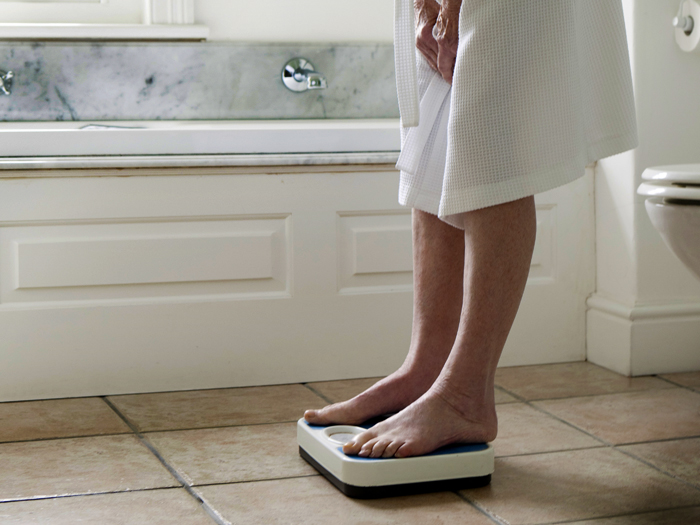3 Weird Reasons You’re Gaining Weight
Staying slim through the years isn’t as simple as calories in, calories out. Here are the age-related changes that can mess with the scale.

As you get older, it becomes more difficult to keep your weight in check. You’re likely well aware of this fact.
The most common culprits: slower metabolism, less active lifestyle, or menopause for women. But sometimes, the source of weight gain is much more mysterious.
“A lot of changes occur in the body during the aging process that people aren’t aware of,” says Craig Primack, M.D., an obesity medicine physician at Scottsdale Weight Loss Center in Arizona. “And these changes can have a large impact on weight.”
Here are three such examples, plus simple ways to tip the scale in your favor.
Weird Reason for Weight Gain #1: Your Body Doesn’t Absorb Protein Like It Used To
“As we get older, our bodies become less sensitive to protein and can absorb less of it,” Dr. Primack says. And since protein is critical to muscle health, this means it becomes more difficult to maintain your muscle mass and continue burning the same amount of calories every day. Remember: Muscle burns more calories than fat, even at rest.
Your body also absorbs amino acids, the building blocks of protein, more slowly with age. Recent research published in the Journal of Nutrition, Health, and Aging found that while amino acid levels spike in one hour after protein consumption for adults ages 20 to 25, it takes three hours in people ages 60 to 75.
More research is needed to determine exactly why older adults absorb less protein, and do so more slowly. But we do know that stomach acid levels decrease with age, Dr. Primack says. And since stomach acids play a role in protein digestion, it’s one possible explanation.
Tip the scale:
Increase your protein intake. According to the National Academy of Medicine, the recommended dietary allowance (RDA) for adults in their 50s and older is 0.8 grams of protein per kilogram of bodyweight—or about 0.36 grams per pound of bodyweight. But research shows that roughly 40 percent of women and men ages 51 and older don’t meet those recs.
Meanwhile, mounting research suggests that for optimal muscle health and metabolism, adults ages 50 and older should consume at least double the RDA for protein. That works out to about 0.7 grams of protein per pound of bodyweight per day. For a 180-pound adult, that’s 126 grams of protein per day.
For maximum benefits, space out your protein throughout the day, suggests Rob Danoff, D.O., director of the family practice residency program at Jefferson Health Northeast in Philadelphia.
Getting 25 to 35 grams of protein at every meal will help keep your muscles fueled with the protein they need, increase your daily calorie burn, and help reverse weight gain, he says. These protein-packed breakfasts and high-protein dinners can help.
Weird Reason for Weight Gain #2: Your Sense of Smell Isn’t What It Used to Be
Loss of sensitivity to smells, called anosmia, affects between 10 and 20 percent of all older adults, according to 2017 research published in the Journals of Gerontology.
What does sense of smell have to do with weight gain? Smell plays a large part in how foods taste, Dr. Primack explains, so when smell fades, foods can taste bland.
This may result in a loss of interest in food, which could cause unexplained weight loss. But it can also lead people to seek more flavor, so they eat fewer healthy foods and more processed ones high in artificial flavors, sugar, and salt.
What’s more, when people stop finding pleasure in the taste of foods, the next thing they look to is texture, Dr. Primack says. And the most commonly preferred texture is the creaminess of fat.
Tip the scale:
If you think your sense of smell or taste is dwindling, ask your doctor for a referral to an otolaryngologist (a.k.a. an ear, nose, and throat) specialist. The ENT will be able to rule out nasal problems like polyps, blocked sinuses, and seasonal allergies.
If all checks out, simply understanding how sense of smell can influence your eating habits can help you eat more mindfully going forward. Try adding flavor with herbs and spices or marinades. Plus, harness the power of exercise to sharpen your senses.
Weird Reason for Weight Gain #3: Your Circadian Rhythms Are Off
There’s no end to the list of ways poor sleep can trigger weight gain, including increasing levels of the hunger hormone ghrelin and slashing levels of the feel-full hormone leptin, Dr. Danoff explains.
Even short periods of too little sleep can have a big impact. A 2015 study published in Diabetologia found that as little as four days of sleep deprivation reduces the body’s insulin sensitivity, which increases the risk for fat storage.
Subscribe to our newsletter
It's quick and easy. You could be one of the 13 million people who are eligible.
Already a member? Click to discover our 15,000+ participating locations.
Follow Us
Not making it a priority to get seven to nine hours of sleep each night is one thing, but if you’re physically unable to fall and stay asleep, changes in your body’s circadian rhythms could be to blame.
A research review in the Journal of Clinical Endocrinology and Metabolism shows that production of melatonin, the hormone that helps you sleep at night and regulates your sleep-wake patterns, decreases with age. This often causes people to wake up earlier, not sleep through the night, or need naps during the day, Dr. Primack says.
Another potential disruptor: cataracts, which happen when protein that’s naturally found in the eye starts to clump together, making the lens cloudy and obscuring vision. In people with cataracts, light might not effectively enter the eye to help your body know it’s daytime and time to be awake, Dr. Primack explains.
Tip the scale:
Start by prioritizing good sleep hygiene—no excuses. That includes going to bed and waking up at the same time every day, avoiding electronics at least one hour before bed, and using your bed only for sleep and sex—no work, TV watching, or anything else that’s associated with a wakeful state. (See five ways to fall and stay asleep, starting tonight!)
Also, try keeping a sleep journal to track how many hours you’re sleeping at night and when you find yourself needing a nap. This can help you ID and deal with any lifestyle issues that are keeping you up at night.
If good sleep hygiene isn’t enough to score you a good night’s rest, the next step is talking with your primary care physician or a sleep specialist. He or she will want to check for any underlying health problems like sleep apnea.
Last, for those dealing with cataracts, talk to your doctor about whether surgery makes sense for you. A 2017 review published in the International Journal of Ophthalmology found that cataract surgery improved sleep in people with both cataracts and insomnia.
Take Your Favorite SilverSneakers Classes Online!
SilverSneakers members can access live fitness classes and wellness workshops through SilverSneakers LIVE. See the latest schedule and RSVP for classes here.
Not a member? If you have a Medicare Plan, it may include SilverSneakers—at no additional cost. Check your eligibility instantly here.




